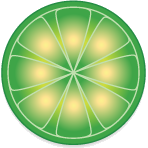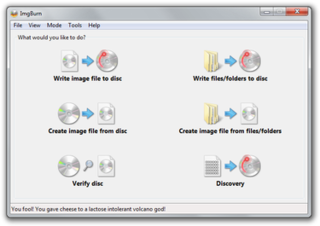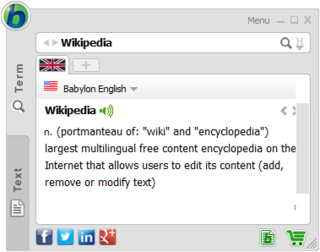
LimeWire was a free peer-to-peer file sharing client for Windows, macOS, Linux, and Solaris. Created by Mark Gorton in 2000, it was most prominently a tool used for the download and distribution of pirated materials, particularly pirated music. In 2007, LimeWire was estimated to be installed on over one-third of all computers globally.
SourceForge is a web service founded by Geoffrey B. Jeffery, Tim Perdue, and Drew Streib in November 1999. The software provides a centralized online platform for managing and hosting open-source software projects, and comparing and reviewing business software. It provides source code repository hosting, bug tracking, mirroring of downloads for load balancing, a wiki for documentation, developer and user mailing lists, user-support forums, user-written reviews and ratings, a news bulletin, micro-blog for publishing project updates, and other features.

Gentoo Linux is a Linux distribution built using the Portage package management system. Unlike a binary software distribution, the source code is compiled locally according to the user's preferences and is often optimized for the specific type of computer. Precompiled binaries are available for some packages. Gentoo runs on a wide variety of processor architectures.

FileZilla is a free and open-source, cross-platform FTP application, consisting of FileZilla Client and FileZilla Server. Clients are available for Windows, Linux, and macOS. Both server and client support FTP and FTPS, while the client can in addition connect to SFTP servers. FileZilla's source code is hosted on SourceForge.
CNET Download is an Internet download directory website launched in 1996 as a part of CNET. Initially it resided on the domain download.com, and then download.com.com for a while, and is now download.cnet.com. The domain download.com attracted at least 113 million visitors annually by 2008 according to a Compete.com study.
PDFCreator is an application for converting documents into Portable Document Format (PDF) format on Microsoft Windows operating systems. It works by creating a virtual printer that prints to PDF files, and thereby allows practically any application to create PDF files by choosing to print from within the application and then printing to the PDFCreator printer.
Browser hijacking is a form of unwanted software that modifies a web browser's settings without a user's permission, to inject unwanted advertising into the user's browser. A browser hijacker may replace the existing home page, error page, or search engine with its own. These are generally used to force hits to a particular website, increasing its advertising revenue.
Christopher Boyd, also known by his online pseudonym Paperghost, is a computer security researcher.

ImgBurn is an optical disc authoring program that allows the recording of many types of CD, DVD and Blu-ray images to recordable media. Starting with version 2.0.0.0, ImgBurn can also burn files and data directly to CD or DVD. It is written in C++. It supports padding DVD-Video files so the layer break occurs on a proper cell boundary.
A browser extension is a software module for customizing a web browser. Browsers typically allow users to install a variety of extensions, including user interface modifications, cookie management, ad blocking, and the custom scripting and styling of web pages.

Messenger Plus! is an add-on for Windows Live Messenger and Skype. The software provides additional functionality to Microsoft's Instant messaging client, Windows Live Messenger, by adding its own controls to the main interface. These controls affect Messenger's behaviour and appearance, often through additional dialog boxes.

Vuze is a BitTorrent client used to transfer files via the BitTorrent protocol. Vuze is written in Java, and uses the Azureus Engine. In addition to downloading data linked to .torrent files, Azureus allows users to view, publish and share original DVD and HD quality video content. Content is presented through channels and categories containing TV shows, music videos, movies, video games, series and others.

Babylon is a computer dictionary and translation program developed by the Israeli company Babylon Software Ltd. based in the city of Or Yehuda. The company was established in 1997 by the Israeli entrepreneur Amnon Ovadia. Its IPO took place ten years later. It is considered a part of Israel's Download Valley, a cluster of software companies monetizing "free" software downloads through adware. Babylon includes in-house proprietary dictionaries, as well as community-created dictionaries and glossaries. It is a tool used for translation and conversion of currencies, measurements and time, and for obtaining other contextual information. The program also uses a text-to-speech agent, so users hear the proper pronunciation of words and text. Babylon has developed 36 English-based proprietary dictionaries in 21 languages. In 2008–2009, Babylon reported earnings of 50 million NIS through its collaboration with Google.
In free and open-source software (FOSS) development communities, a forge is a web-based collaborative software platform for both developing and sharing computer applications.

OSDN is a web-based collaborative development environment for open-source software projects. It provides source code repositories and web hosting services. With features similar to SourceForge, it acts as a centralized location for open-source software developers.
OpenCandy was an adware module and a potentially unwanted program classified as malware by many anti-virus vendors. They flagged OpenCandy due to its undesirable side-effects. It was designed to run during installation of other desired software. Produced by SweetLabs, it consisted of a Microsoft Windows library incorporated in a Windows Installer. When a user installed an application that had bundled the OpenCandy library, an option appeared to install software it recommended based on a scan of the user's system and geolocation. Both the option and offers it generated were selected by default and would be installed unless the user unchecked them before continuing with the installation.

Chrome Web Store is Google's online store for its Chrome web browser. As of 2024, Chrome Web Store hosts about 138,000 extensions and 33,000 themes.
Download Valley is a cluster of software companies in Israel, producing and delivering adware to be installed alongside downloads of other software. The primary purpose is to monetize shareware and downloads. These software items are commonly browser toolbars, adware, browser hijackers, spyware, and malware. Another group of products are download managers, possibly designed to induce or trick the user to install adware, when downloading a piece of desired software or mobile app from a certain source.
A potentially unwanted program (PUP) or potentially unwanted application (PUA) is software that a user may perceive as unwanted or unnecessary. It is used as a subjective tagging criterion by security and parental control products. Such software may use an implementation that can compromise privacy or weaken the computer's security. Companies often bundle a wanted program download with a wrapper application and may offer to install an unwanted application, and in some cases without providing a clear opt-out method. Antivirus companies define the software bundled as potentially unwanted programs which can include software that displays intrusive advertising (adware), or tracks the user's Internet usage to sell information to advertisers (spyware), injects its own advertising into web pages that a user looks at, or uses premium SMS services to rack up charges for the user. A growing number of open-source software projects have expressed dismay at third-party websites wrapping their downloads with unwanted bundles, without the project's knowledge or consent. Nearly every third-party free download site bundles their downloads with potentially unwanted software. The practice is widely considered unethical because it violates the security interests of users without their informed consent. Some unwanted software bundles install a root certificate on a user's device, which allows hackers to intercept private data such as banking details, without a browser giving security warnings. The United States Department of Homeland Security has advised removing an insecure root certificate, because they make computers vulnerable to serious cyberattacks. Software developers and security experts recommend that people always download the latest version from the official project website, or a trusted package manager or app store.







